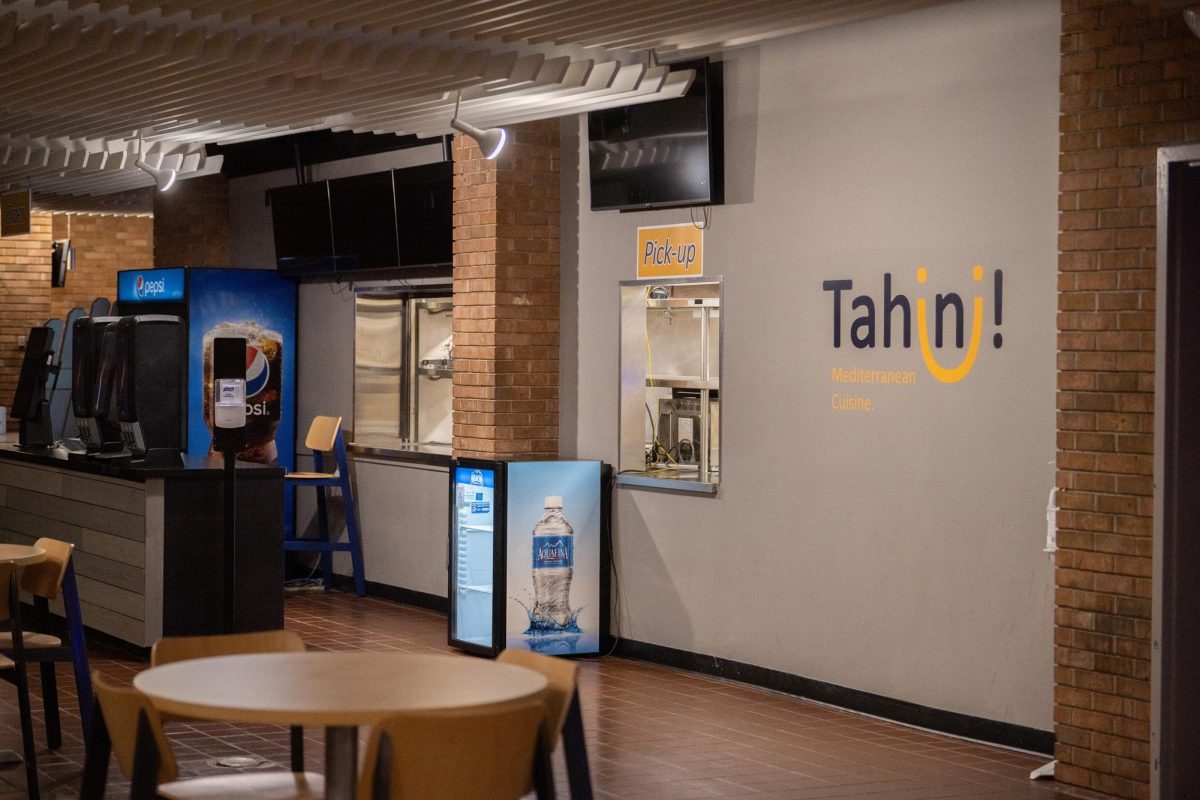Tahini Mediterranean Cuisine, a restaurant previously located in the basement of the student center at Kent State, was shut down by the university due to repeated health department violations with no correction, according to a termination letter obtained through a public records request.
This information has not been publicly released by Tahini. Hundreds of students have signed a petition to bring Tahini back after the restaurant told students through Instagram comments they would be closed permanently unless students protested to have it back.
On Oct. 22, a letter terminating the contract between Tahini and the university was sent to owners Ayham Abuzeid and Layla Alchaer from Eboni Pringle, senior vice president of student life, and Mark Polatajko, senior vice president of finance and administration.
Timeline of events according to the contract termination letter
Oct. 31, 2023:
After opening on Sept. 6, 2022, the Portage County Health Department found Tahini’s first health violations, one critical and eight non-critical.
Feb 13, 2024:
Another inspection found seven of the non-critical violations again.
Aug. 7, 2024:
An in-person meeting with both Abuzeid and Alchaer was conducted, which the letter states placed a “high emphasis on cleaning and having zero health department violations for the academic year.”
Sept. 24, 2024:
Five non-critical violations were found, three of which were repeats from the February inspection.
KSU Culinary Services is stated to have followed up on multiple dates regarding the violations that were to be corrected and maintained. None of the communications received a response, and no corrections were observed, per which the letter cited the repeat violations from county officials.
Fryer fire
Oct. 8, 2024:
A fryer fire occurred during the time in which Hailey Demchak, a sophomore visual communication design student and passionate Tahini worker, was present.
“I was there with three of my coworkers while Ayham was at the front counter,” Demchak said. “I had no clue it was even happening. It was close to closing time so it didn’t really affect the rest of the day. I didn’t think much of it.”
The next day, she received a text from Abuzeid letting her know the restaurant would be closed the rest of the week and open the following Monday.
Oct. 10, 2024:
The county health department conducted a reopening inspection. They determined the restaurant could reopen after the cleaning of equipment was addressed and they were given approval from Culinary Services.
Oct. 13, 2024:
Workers received an email stating approval was not granted to reopen yet, but to stay available for shifts, according to Demchak.
Oct. 16, 2024:
The most recent internal inspection occurred, during which the letter states Culinary Services observed food products in cold storage dated back to Aug. 10, which they said was well past the seven days of storage life mandated by the health department and the FDA. An email was sent out the day of regarding this, to which there was no response regarding the out of date food being discarded or taking care of the violation.
Oct. 18, 2024:
A response was sent by the owners, stating they have had “violations and issues in the operations area.” A follow-up inspection was scheduled for Oct. 22, requiring all cleaning left to be completed, to which no response was received.
Oct. 20, 2024:
Demchak said Abuzeid told workers the part needed to fix the fryer would arrive in a couple of days, and once it was installed, they would reopen. He assured them they would all see each other soon.
Oct. 22, 2024:
The contract termination was sent, and workers found out on Oct. 25 that Tahini would be closed for good.
Student reactions
Although students were not aware of what was going on behind the scenes, their passion for Tahini, as well as the owners’ passion, has led to upset among the campus community.
“Tahini has a lot of fans on campus, and I know that people really loved it,” Demchak said. “Tahini also offered a lot of help and support to not only me but also all my coworkers, who were mostly international students. We had a community and a family at Tahini, and I miss all of them so much.”
Demchak said Abuzeid, who is also a professor at Kent State, was one of the most kindhearted bosses she ever had.
“He and Layla worked really hard to make Tahini a welcoming work environment,” she said. “There would be times when my coworkers and I would mess up, and they always taught us how to improve and worked on being better for us as well.”
Brendan Lynch, a sophomore political science student who started a petition to save Tahini, said he was not aware of the violations when he started the petition, but still believes the university should reopen the restaurant under new management.
“It would provide more jobs, add diversity to a student’s diet and provide a halal option,” Lynch said. “I also think the university failed to be transparent about these issues, and that is another issue that should be brought up.”
He said the university must care for its students and look out for their best interests.
“I and so many other students lost their favorite on-campus place to eat,” Lynch said. “I am not a voice for Tahini, and I am not associated with them, but I am a voice for the people, and the people were angry. Tahini was one of the only healthy options on campus and added so much variety to KSU Culinary.”
Lynch’s petition has garnered over 700 signatures, and he said most of the support has come from the Muslim community and members of the Student Multicultural Center.
With Tahini being the only Halal option on campus, he said many students will have trouble finding food. Halal refers to food prepared in accordance with Islamic dietary laws, and Lynch said Muslim students have expressed their concerns about not having an on-campus food option anymore.
He said he believes cultural representation is at the heart of this issue, and sees the closing of Tahini as an injustice to the Muslim community.
Patrick Hensel, a freshman exploratory student, said he feels the same. He said Tahini served food that acted as a window into the world of Mediterranean cuisine.
“It helps to build a sense of curiosity surrounding the culture the food originated from,” Hensel said. “While it might not get someone to travel to the food’s country of origin, it at the very least encourages an appreciation for the cuisine of a different nation.”
He said he went to Tahini once or twice per week, and their food was unlike all the other on-campus options.
“Tahini was one of the very few places where a student not only had consistent access to a different variety of food but also where a wide variety of menu items were purchasable via meal swipes,” Hensel said. “The meal swipe options at Tahini actually felt like a real menu with actual choices, rather than just an afterthought consisting of only the cheapest bare-bone options.”
Lynch hopes his petition and protesting will lead to change.
“When I first started the petition, I just wanted my restaurant back,” he said. “I have now seen that it is becoming a social justice issue and so much more is at stake.”
Tahini owners declined to comment, stating they are in “no position now to make any public release as [they] are in discussions about things with stakeholders.”
Lauren Cohen is a reporter. Contact her at [email protected]










